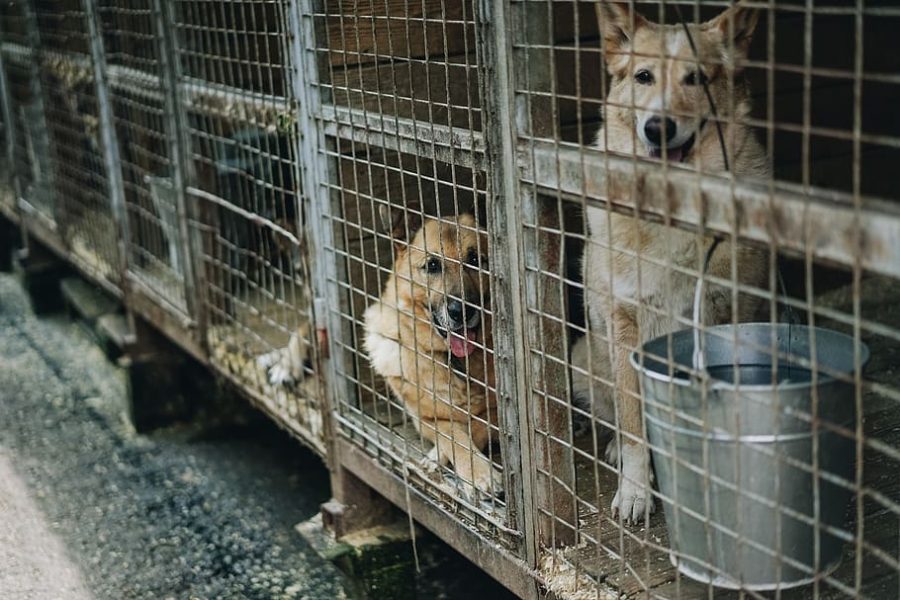Stopping puppy mills starts with you
April 26, 2023
A dog can spend their whole life in a cage. A tiny cage with more than likely other cages stacked on top. It’s a cruel life for dogs that never get a chance to escape their circumstance. They never get to chase a ball nor a squirrel, never get to play in the snow and the mud, never get to know a kind pat on the head or a good belly scratch. They never get to be a dog being a dog.
It’s sad but that’s the life of a breeding dog at a puppy mill. That is a dog’s life until that dog can’t breed anymore. When the dog cannot provide more pups, they are usually killed. For the puppies it’s not that much better. Living in cramped cages with poor nutrition, they’re hungry, filthy, and often sick.
WHAT IS A PUPPY MILL?
Probably the most basic definition is that a puppy mill is an inhumane high-volume dog breeding facilities that churns out puppies for profit, ignoring the needs of the pups and their mothers. Documented abuse at puppy mills includes forced over breeding, inbreeding, disease, overcrowding, filth, and malnutrition. Smaller scale breeders who are irresponsible are usually referred to as backyard breeders, although the problems are the same regardless of the size of the operation.
Irresponsible breeders and puppy brokers are not concerned with the health of the puppies they sell. They don’t usually keep good records of which puppies came from which parents, and they don’t selectively breed out undesirable traits. Due to poor sanitation, overbreeding, and a lack of veterinary care, the puppies from puppy mills frequently suffer from a variety of health issues, such as Kennel Cough, and Parvovirus, creating heartbreaking challenges for families who should be enjoying the delights of adopting a new family member.
“These animals don’t even know what the touch of a human feels like” according to Gina Lattuca, a veteran of the Erie County SPCA. When they are rescued, they’ll bite when picked up because they have “touch sensitivity, not aggression,” stated Lattuca.
Females in puppy mills are bred every time they come into heat, and when they can no longer serve as an “incubator,” they are killed to make way for a dog that can. As a dog is repetitively bred, she produces smaller and smaller liters until she is taken “out of service,” as Doggies.com stated, due to the reduction in her productivity and ultimately profitability.
IS THERE ANYTHING POSITIVE ABOUT A PUPPY MILL?
“I’ve been with the SPCA 33 years, and I cannot say one thing redeeming about a puppy mill” said Lattuca, somewhat angrily. Puppy mills may pay taxes, but a true puppy mill has no advantages for the poor suffering dogs. When asked if there was anything positive about a puppy mill, Niagara County SPCA Inv. Rick Salsbury, clearly taken aback by the question, said right out, “Nothing that I can think of.”
GOV. HOCHUL TAKES A BITE OUT OF PUPPY MILLS
On Dec. 15, 2022, the governor’s office announced that,” Gov. Kathy Hochul signed legislation to ban the sale of dogs, cats, and rabbits at retail pet stores, aiming to end the puppy mill-to-pet store pipeline and stop abusive breeders. “Dogs, cats, and rabbits across New York deserve loving homes and humane treatment,” Governor Hochul said. “I’m proud to sign this legislation, which will make meaningful steps to cut down on harsh treatment and to protect the welfare of animals across the state.”
“Thank God the governor signed that bill,” stated Lattuca, “now pet stores have to deal with reputable businesses like ours [SPCA] and other responsible venues.”
The SPCA say’s, a responsible breeder will:
Allow you to visit the puppy and parents in-person
Only breed one type of dog and know the breed well
Encourage multiple visits with your entire family to meet the pup
Never sell to a pet store or unknown buyers over the internet
Has a contract that requires the return of puppy at any point in time during the life of
the pup if the person cannot keep or care for him/her
Has a guarantee for health and temperament
According to the SPCA, signs of a puppy mill include:
No requirements to purchase the dog
Will not allow you to meet parents of the puppy or let you see where they live
Has multiple types of puppies for sale or always has puppies available
Being able to purchase online or at a pet store
They are willing to ship the puppy to you without ever having met you
They allow the puppy to leave the mom when under 8 weeks old
According to the Humane Society of the United States 10,000 puppy mills are currently active in the United States. 500,000 dogs are kept solely for breeding purposes in puppy mills and 2.6 million puppies are sold each year after originating in a puppy mill.
RESCUE A DOG TODAY AND A DOG WILL RESCUE YOU RIGHT BACK
Many make decisions out of convenience but when dealing with the life of an animal, convenience should take a back seat. For so many, emotions will play into it as well. Lattuca, told a story about a friend who was in a situation: “your head’s telling you something is not right, but your heart says I have to help this dog get out of this situation.” Consider adopting a dog or puppy. Rescues and shelters have all types of dogs, including purebreds, mixes, puppies, and adults. It’s a beautiful thing if you can offer a home to dog that has none.




